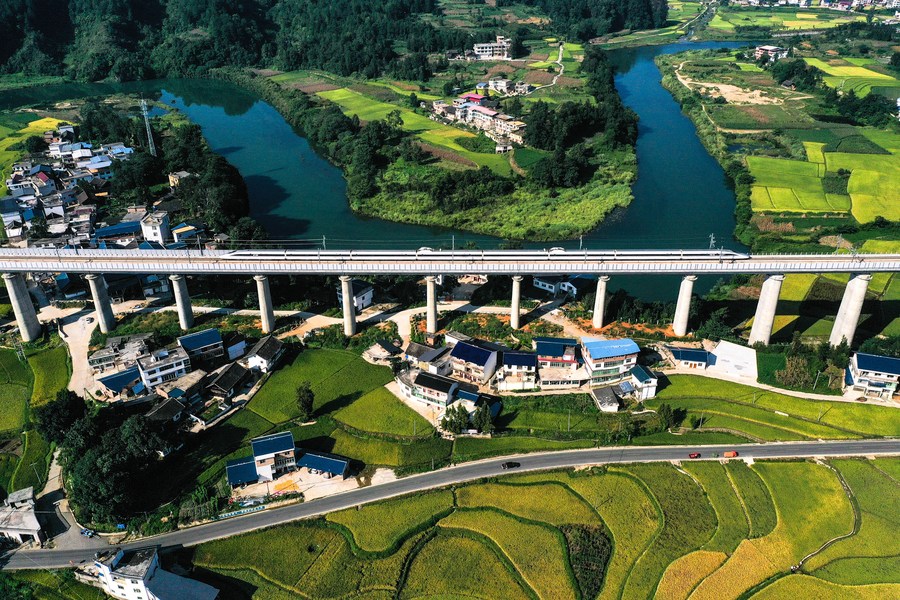
This aerial photo taken on Aug. 31, 2023 shows a bullet train running on the Guiyang-Nanning high-speed railway in Duyun City, southwest China's Guizhou Province. (Xinhua/Yang Wenbin)
BEIJING, Sept. 28 (Xinhua) -- China has made solid progress in developing sustainable transport since 2012 and so far the sector has entered a new stage of high-quality development, Li Yang, vice minister of the Ministry of Transport said at a press conference held on September 21.
China has built the world's largest high-speed railway network, expressway network, postal and express delivery network, as well as world-class port clusters. Meanwhile, the country's autonomous driving, which is a crucial part of sustainable transport, has been upgraded in recent years.
While accelerating building up its strength in transport, China also continues its efforts to promote global transport cooperation and provide new opportunities for the world with its own development.
-- National comprehensive transport network takes shape
A national comprehensive transport network has taken shape in China. Data from the Ministry of Transport showed that China's comprehensive transport network exceeded 6 million kilometers by the end of 2022.
The country also has the world's largest high-speed railway network, expressway network, postal and express delivery network, as well as world-class port clusters, Li said.
China's transport services continue improving. The country leads the world in terms of passenger and cargo turnover of railways, highways, waterways, and civil aviation, as well as the cargo throughput at ports. Meanwhile, Chinese towns, townships and villages with feasible conditions have been connected by concrete roads and gained access to bus services and postal services.
The capacity for sci-tech innovation in transport has been enhanced. A batch of new transport infrastructure application scenarios have been implemented, including intercity smart expressway connecting Hangzhou, Shaoxing and Ningbo in east China's Zhejiang Province, and intelligent waterway section of the Beijing-Hangzhou Grand Canal. C919, China's self-developed large passenger aircraft, was delivered and completed its first commercial flight. Smart logistics technology are being applied in the postal and express delivery industries at a faster pace.
Remarkable advancements have been achieved in developing green and low-carbon transport. Multimodal transportation are promoted, and low-carbon transport facilities and equipment are used at an accelerated pace. By the end of last year, the electrification rate of national railways reached 73.8 percent. Furthermore, the number of new energy buses in urban areas and new energy taxis exceeded 540,000 and 300,000, respectively.
International exchanges and cooperation in the transportation sector have been deepened. So far, China-Europe freight trains have reached over 200 cities in 25 European countries and regions. China's international waterway transport routes have been launched to connect with 100-odd countries and regions, and its postal and express delivery services have expanded presence in over 220 countries and regions.
-- Autonomous driving technology is applied on certain scale
Autonomous driving, as an innovation area of intelligent transportation, also constitutes a crucial part of sustainable transport.
In recent years, China has witnessed a continuous upgrade of autonomous driving technology and enhancement in the industrial system, said Cen Yanqing, director of the science and technology department of the Ministry of Transport. According to Cen, autonomous driving technology has been applied on a certain scale in several scenarios, especially in urban travel services and port operations.
Cities such as Beijing, Shanghai, Guangzhou, and Wuhan have carried out demonstration applications of autonomous driving travel services. Ports such as Shanghai Port, Tianjin Port, and Shenzhen Mawan Port have actively applied intelligent trucks and unmanned container transfer vehicles. These examples have shown the promising prospects of autonomous driving technology.
To give full play of the role of scenario innovation in upgrading technology and industry, the Ministry of Transport initiated intelligent transportation pilot application projects last year, with focus on autonomous driving. 14 pilot tasks were introduced in the field of autonomous driving, attracting 100-odd innovative entities to put over 1,000 self-driving vehicles into use, added Cen.
In recent years, the Ministry of Transport has identified a number of autonomous driving test bases and demonstration areas, and implemented a number of national key research and development projects.
For example, supported by the ministry, the Yizhuang autonomous driving demonstration zone in Beijing has seen the cumulative autonomous driving mileage exceed 17 million kilometers, of which about 9.6 million kilometers are commercial autonomous driving and about 2.1 million kilometers are unmanned driving.
-- Promoting global transport development
While accelerating building up its strength in transport, China also continues to promote global transport cooperation and provide new opportunities for the world with its own development.
The country held the Global Sustainable Transport Forum (2023) from September 25 to 26 in Beijing, honoring its sustainable commitment to boost greener and smarter transport.
Themed on "Sustainable Transport: Working Together to Promote Global Development", the forum attracted about 1,000 participants, including government officials, officials from international organizations, and business representatives.
During the forum, China proposed a joint action initiative of ministers of transport at the Global Sustainable Transport Forum, also known as the Beijing Initiative. This initiative emphasizes the importance of sustainable transport for global economic development and improvement of people's livelihoods, and calls on all parties to take positive actions to jointly create a safe, convenient, efficient, green, and economical sustainable transport system.
The Beijing Initiative, which reflects China's contributions to promoting Global Development Initiatives (GDI) and implementing the U.N. 2030 Sustainable Development Goals, has won support from 25 countries and international organizations, according to Li Xiaopeng, minister of the Ministry of Transport.
At the event, China released a report on sustainable transport in the country in 2022 to share its philosophy and latest practices of sustainable transport development.
It also signed multiple cooperation documents with the United Nations Department of Economic and Social Affairs (UNDESA) and countries like Serbia, Mongolia, Saudi Arabia, Singapore to strengthen exchanges and cooperation on transport sci-tech innovation. (Edited by Su Dan with Xinhua Silk Road, sudan@xinhua.org)




 A single purchase
A single purchase









